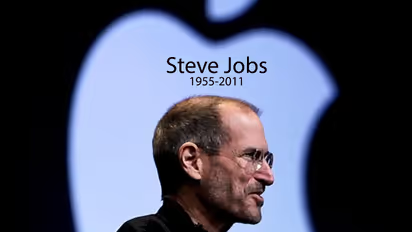Remembering Steve Jobs: The visionary who revolutionised the phone world

Synopsis
Steve Jobs was a visionary who led a mobile computer revolution. The revolutionary iPhone changed the world as we knew it.
Ten years later on 9 January, 2007, he cemented Apple's comeback with the greatest announcement ever - the iPhone - that changed the world as we knew it. Today, the most valuable company in the world, Steve Jobs was clearly a tech visionary who believed in building tools to simplify your day to day lives.
An orator who staunchly believed, "Customers don't know what they want." And, he was right. His keynotes are the most sought after with people waiting in anticipation to see what magnificent product will be launched. We would have been happier with a keypad phone without realising that a touchscreen is revolutionary or apps will make our lives easier.
It was Jobs' vision that introduced a keypad-less touchscreen with a user interface that most companies are trying to emulate. Today, 10 years after the first iPhone was launched and 5 years after Steve Jobs succumbed to pancreatic cancer after battling it for nearly a decade, it’s the iconic keynote in 2007 that remains the biggest consumer product launch in history.
iPhone turns 10:
As years passed on, we’ve realised that Apple products just don’t change the market dynamics, but also the way people make their choices. That is exactly why we saw smartwatch category suddenly go mainstream with every company trying to build a smartwatch. This was simply triggered by a whiff of Apple’s plans for a watch. Anything and everything Apple does has a value to it, and this value is a legacy of Steve Jobs.
Jobs' craved for design perfection. We've seen reports claiming how Jobs design chief Jony Ive for 'not being very efficient', while another says that he acknowledged former Apple CEO had wasted his talent. It was under Jobs' leadership that Ive's team build some solid and premium products like the iPod, iPhone and iPad.
In the years, we've seen, Apple isn't just a company churning out products, but a vision that changes the way we make our choices. Steve Jobs changed the world as we knew it with one product at a time. Today, touchscreens have become a standard and keypad have been booted out of the smartphone world.
Watch Steve Jobs unveiling the first iPhone ten years ago:
There is an app for everything! Doesn't this stand true today? But, years ago, it was Jobs who told developers to develop apps for the iPhone. A couple of years later, we had the App Store. The same Apple App Store has been helping fill Apple's coffers and recently hit a record $240 million worth of app purchases on New Year's Eve.
TheNextWeb had managed to dig out a speech that Jobs' had given in 1983 at the Center for Design Innovation. "Apple’s strategy is really simple. What we want to do is we want to put an incredibly great computer in a book that you can carry around with you and learn how to use in 20 minutes," Jobs said.
And, he did just that in 2010 with the launch of the iPad. Though the iPad wasn't an instant hit, but people slowly started cultivating the taste for this new product category. What was fascinating is how everyone wanted to build a tablet. Yes, every company was ready to churn out a tablet. It was even implemented as a handy device to introduce technology to students. Though a falling market, tablets still form a small part of the tech industry with innovations like 2-in-1 hybrid devices.
It took some time for Apple to dive into the next and the first unique category after Jobs' death - iWatch. Meanwhile, the company's inability to deliver something new under new CEO Tim Cook was often questioned. A book by a Wall Street Journal technology reporter Yukari Iwatani Kane called Apple like an empire without an emperor, on the brink of dissolution. Jobs and his powerful vision were being missed and many believed the company has begun crumbling. That clearly hasn't happened as Tim Cook has managed to drive the company while successfully moving out of Jobs' shadow. However, with Steve Jobs has gone the vision, which sometimes makes us wonder, how the tech world could have been different if he would have been around.
Find the latest Technology News covering Smartphone Updates, AI (Artificial Intelligence) breakthroughs, and innovations in space exploration. Stay updated on gadgets, apps, and digital trends with expert reviews, product comparisons, and tech insights. Download the Asianet News Official App from the Android Play Store and iPhone App Store for everything shaping the future of technology.